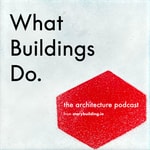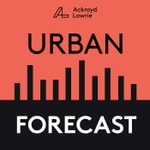What Buildings Do: An architecture podcast. – Détails, épisodes et analyse
Détails du podcast
Informations techniques et générales issues du flux RSS du podcast.

What Buildings Do: An architecture podcast.
Story, Building
Fréquence : 1 épisode/31j. Total Éps: 49

Classements récents
Dernières positions dans les classements Apple Podcasts et Spotify.
Apple Podcasts
🇬🇧 Grande Bretagne - design
28/07/2025#92🇬🇧 Grande Bretagne - design
27/07/2025#73🇬🇧 Grande Bretagne - design
26/07/2025#55🇬🇧 Grande Bretagne - design
25/07/2025#34🇬🇧 Grande Bretagne - design
12/07/2025#93🇬🇧 Grande Bretagne - design
11/07/2025#76🇬🇧 Grande Bretagne - design
10/07/2025#56🇬🇧 Grande Bretagne - design
09/07/2025#37🇬🇧 Grande Bretagne - design
08/07/2025#22🇬🇧 Grande Bretagne - design
07/07/2025#54
Spotify
Aucun classement récent disponible
Liens partagés entre épisodes et podcasts
Liens présents dans les descriptions d'épisodes et autres podcasts les utilisant également.
See all- http://emmettscanlon.ie
7 partages
- https://www.bellphillips.com/
4 partages
- http://www.rachaellavelle.com/
3 partages
- https://youtu.be/_dRSnw_nytc
1 partage
Qualité et score du flux RSS
Évaluation technique de la qualité et de la structure du flux RSS.
See allScore global : 62%
Historique des publications
Répartition mensuelle des publications d'épisodes au fil des années.
43. John Tuomey & Adrian Duncan | Books Downstairs
Saison 1 · Épisode 43
mercredi 12 juin 2024 • Durée 54:52
This special episode is a live recording made at IAF House, Dublin on June 10th, 2024.As part of conversation series, Books Donwstairs, on books and architecture, architect and writer John Tuomey and author and visual artist Adrian Duncan discussed their books, writing, memory, growing up with engineers and knowing your place. The event was chaired by architect and academic Miriam Delaney.
.
First Quarter by John Tuomey, published by Lilliput Press
In his reflective and enriching memoir, John Tuomey navigates the places and memories of his life over the scope of twenty-five years. First recognised for the urban regeneration of Dublin’s Temple Bar, which included the construction of the Irish Film Institute, the National Photographic Archive and Gallery of Photography, his life in architecture led him to design social and cultural spaces such as the Lyric Theatre in Belfast, the Glucksman Gallery in UCC and the Victoria & Albert East Museum in London.
.
.Little Republics: The Story of Bungalow Bliss by Adrian Duncan, published by Lilliput Press
Bungalow Bliss, first published in 1971, was a book of house designs that buyers could use to build a home for themselves affordably. It first appeared two years before Ireland was to join the EEC as a self-published catalogue by Jack Fitzsimons from his Kells Art Studios in County Meath. He and his wife designed and collated it and printed it locally.Fitzsimons sold these books out of his car to newsagents, petrol garages and bookshops. Over the course of thirty years, Fitzsimons sold over a quarter of a million copies of his catalogue. The first edition contained twenty designs – the final edition contained two hundred and sixty.
.
Recorded live | Additional music by Rachael Lavelle.
What Buildings Do is spefically supported by the Irish Architecture Foundation in its mission to reach audiences.
42. Aisling Rusk & Anthony Engi Meacock | Reimaginging Elderhood 2
Saison 1 · Épisode 42
mercredi 29 mai 2024 • Durée 55:03
34. BOOK REVIEW | The Dublin Architecture Guide+The Dignity of Everyday Life
Saison 1 · Épisode 34
samedi 4 décembre 2021 • Durée 29:12
33. Part W Collective | Zoë Berman
Saison 1 · Épisode 33
mercredi 24 novembre 2021 • Durée 53:37
In this episode host Emmett Scanlon speaks to Zoë Berman of Studio Berman. Zoë is an architect and a university lecturer. She has lectured on design and equity, and written for the RIBA Journal, Blueprint magazine and Architecture Today. Zoë is also one of the founding members of the Part W Collective, which describes itself as “a collective of engaged and proactive women working in design education, architecture, planning, engineering, policy, infrastructure and sustainability."
Founded in 2018, the collective says it is intergenerational - "formed by women from diverse backgrounds who are working together to call time on gender inequality, in all its forms, in our built environment."
In the podcast Zoë talks about the work of Part W, in particular the alternative list campaign, their first campaign and one which simply asked, if we did not have the list of men who had previously won the Royal Institute of British Architects Royal Gold Medal, who would be on that list? Who were the architects who were women who had been overlooked, forgotten or ignored? From there we discuss more broadly the challenges faced by women working in the built environment and architecture.
Members work in the areas of architecture, project management, place making, sustainable transport, design eduction and journalism - and include Christine Murray, Dr. Harriet Harriss, Hilary Satchwell, Kelly Clark, Sarah Castle, Sarah Wigglesworth, Yemi Aladerun, Sarah Ackland, Nadine Adamski and Fiona MacDonald and we work in friendship with multiple volunteers and supporters.
ABOUT:Zoë Berman is an architect, university lecturer and founder of Part W – an action group founded in 2018 that campaigns for gender equality across the built environment sector. Zoë is director of Studio Berman, has lectured extensively on design and equity, and written for the RIBA Journal, Bluep;rint magazine and Architecture Today. She is a Design Council Expert and member of the Oxford Design Review Panel. Zoë is writing a book profiling women who are shaping the design of cities.
Portrait photo: Morley von Sternberg
32. Soil Lab
Saison 1 · Épisode 32
mercredi 6 octobre 2021 • Durée 50:30
In the podcast Emmett Scanlon talks to James Albert Martin and Eibhlín Ní Chathasaigh, who together with Anne Dorthe Vester and Maria Bruun are Soil Lab. In September 2021, Soil Lab unveiled their installation on a vacant lot in Chicago as part of the Chicago Architecture Biennial.
In the podcast the pair discuss the project from the initial idea which, after an open call from the Danish Arts Foundation, was to make a housing for a ceramic kiln on the site, and all the way through to the opening. They share the obvious logistic challenges of making a project like this from Denmark and Ireland and in America, especially during a pandemic. However, challenging as it was, it is clear the team remain enthused, emboldened and engaged with and by the work and all that unfolded day by day across the project, and in particular how the project was enriched by the participation of residents and others who live and work adjacent to the site. James begins by telling us about the Chicago Architecture Biennial and from their pair talk directly and honestly about what happened, what they learned, and a little about what might be next.
More about the project here: https://www.instagram.com/soillabnorthlawndale
ABOUT SOIL LAB
The Soil Lab project team is made up of three architects, James Albert Martin, Eibhlín Ní Chathasaigh, and Anne Dorthe Vester, and one designer, Maria Bruun, working across different scales, materials, and disciplines. James, Eibhlín, and Anne Dorthe studied together at the Aarhus School of Architecture in Denmark and have since collaborated on several projects. James and Eibhlín are based in Dublin, where they have both worked for internationally renowned architecture firms. Maria and Anne Dorthe are based in Copenhagen, where they founded the studio MBADV in 2013. Their practice with MBADV is at the intersection of architecture, design, and fine art. The project team comes together around a belief in making as a collaborative act: making moments, and making spaces and places for people to gather, to celebrate, and to treasure space.
Eibhlín Ní Chathasaigh graduated from the Aarhus School of Architecture, Denmark, in 2011. Since graduating she has worked for Atelier Peter Zumthor in Switzerland and Grafton Architects in Dublin, Ireland. In 2018, Eibhlín joined James and Anne Dorte in participating in the REFORM Design Biennale with their collaboration Woven Construct, constructed in the garden of Munkeruphus Center of Contemporary Art, in Zealand, Denmark. Eibhlín believes imagination is the central strength of architecture and is interested in the social act of architecture and design as a collaborative conversation. It is with great pleasure that, together with the people of North Lawndale and the Soil Lab team, she embarks on transforming a vacant lot in West Chicago into a new public space.
James Albert Martin is a registered architect with the Royal Institute of the Architects of Ireland and Grade 3 Accredited in Architectural Conservation. He has taught at The Aarhus School of Architecture and at University College Dublin where he is currently a Design Fellow. James is interested in the act of making, and his work is informed by this collaborative act. James holds a MA from The Aarhus School of Architecture and has also undertaken courses in joinery at Capellagården - a school for craft and design. Since graduating he has worked with international studios; Sou Fujimoto Architects, Herzog & de Meuron, and Grafton Architects. In 2018, James, Eibhlín, and Anne Dorte participated in REFORM Design Biennale with their collaboration Woven Construct, a seat, a screen, space, which they constructed in the garden of Munkeruphus, north of Copenhagen.
31. Ryan W. Kennihan
Saison 1 · Épisode 31
mercredi 8 septembre 2021 • Durée 50:23
In 2021 Ryan Kennihan was Highly Commended for a house in north Dublin, in the 'New Into Old' awards, by the Architectural Review. This house is another in a series of lauded house projects undertaken by Ryan and his team in RKA over the last 15 years of practice. In the podcast we begin with that house, exploring how to work with fragments of existing buildings, returning them to a family for use today and into the future. Ryan talks about building trust with clients, working with building contractors, his interest in the existing or as found, the ideas of continuity in architecture, and the ethical position of the architect. The podcast also covers Ryan's views on the culture of architecture in Ireland, and what Ireland offers that many places do not. About to launch their first book on work to date, Ryan concludes by sharing with us a building that continues to surprise him and inform his work in architecture.
About Ryan Kennihan:
Ryan studied architecture at Cornell University. Originally from Chicago, he has been based in Dublin, Ireland since 2002, establishing his practice in 2007. He has taught architecture at University of Navarra in Pamplona, the Porto Academy, University College Dublin and the Dublin School of Architecture at TU Dublin where he is currently a lecturer. Ryan is a registered architect with the Royal Institute of the Architects of Ireland and Grade 3 Accredited in Architectural Conservation.
The podcast was recorded on ZOOM in August 2021 \ Music is by Sinead Finegan \ played by the Delmaine String Quartet.
Architect portrait by Al Higgins.
30. FAF: Future Architects Front | Charlie Edmonds
Saison 1 · Épisode 30
mercredi 18 août 2021 • Durée 46:55
The last years have seen a growing consideration of the terms and conditions of employment for architects. In this episode Emmett Scanlon speaks to Charlie Edmonds who cofounded in 2021 the Future Architects Front, a group founded to end "the exploitative practices" of workers in architecture. Charlie outlines the reasons he and Priti Mohandas founded the group, their engagement with the Royal Institute of British Architects (RIBA), he calls for more diversity in education available to architects and how discussions of preparing students for the "real world" in architecture education are often about holding the status quo and resisting change. |
About FAF: Future Architects Front is a grassroots organisation of architectural workers and students. FAF campaigns to end the exploitative practices that have come to define the world of architecture. It was created and is run by Charlie Edmonds and Priti Mohandas, British designers and researchers. The pair met and began the work of FAF while conducting their Master’s in Architecture and Urban Design at the University of Cambridge. |
Music is by Sinead Finegan, played by the Delmaine String Quartet (Philip Dodd, leader). The podcast was recorded on Zoom in July 2021.
29. BRAUN | Emma Geoghegan
Saison 1 · Épisode 29
mercredi 4 août 2021 • Durée 45:15
28. RetroFirst Campaign | Will Hurst
Saison 1 · Épisode 28
mercredi 21 juillet 2021 • Durée 31:53
In this episode, Emmett Scanlon talks to Will Hurst, the Managing Editor of The Architects’ Journal, based in London. Will has been leading the RetroFirst campaign at the Architect's Journal since late 2019. The podcast covers the origins and ambitions of this campaign, at the heart of which is the idea that "the greenest building is the one that already exists". The conversation touches on the challenges faced by all in construction at a time of climate crisis, the reaction of the architecture profession to RetroFirst, the circular economy and why it makes little climate sense to demolish buildings like the Derby Assembly Rooms in Derby.
_
ABOUT WILL HURST
Will Hurst is an award-winning journalist who has spent his career writing about architecture and construction in the building press and for national titles such as the Guardian, Times and Financial Times. Will has written extensively about the built environment’s contribution to the climate crisis and is currently leading the AJ’s RetroFirst campaign for the re-use of existing buildings. His investigation into the Garden Bridge won him a Press Gazette British Journalism Award in 2017 and was shortlisted for that year’s Paul Foot Award.
__
Music is by Sinead Finegan, played by the Delmaine String Quartet (Philip Dodd, leader).
The podcast was recorded on Zoom in July 2021.
_
27. Annex | ENTANGLEMENT | Venice Biennale 2021
Saison 1 · Épisode 28
mercredi 9 juin 2021 • Durée 01:20:55
The 17th Venice Architecture Biennale open-end at the end of May, a year later than intended, due to Covid restrictions and cancellations. This year the Irish pavilion, at what is one of the largest exhibitions of architecture in the world, was commissioned and curated by an interdisciplinary group of architects, artists and researchers, together known as ANNEX. The pavilion is called, Entanglement, and it explores the materiality of data, and the interwoven human, environmental and cultural impacts of communication technologies. As you will hear this is a particularly Irish concern right now, with Ireland currently being the data capital of Europe, which, at its simplest terms, is manifest in the sheer number of large data centres being built on the Island. But is far more complex and far more profound than that, and in the podcast you will here this very contemporary concern with data and the cloud, has resonances with our histories of social and public space and implications for the planet’s resources, because the cloud is greedy.
Host Emmett Scanlon speaks to David Capener and Donal Lally, two ambassadors for the six member Annex team. The podcast covers working as part of an interdisciplinary team, the genesis of the pavilion, Ireland as a data capital, the value of exhibitions and the value of the Venice Biennale.
Entanglement is due to tour Ireland in 2022.
About Annex:
Annex is an international multidisciplinary research and design collective, comprised of a core team of
architects, artists, and urbanists, whose work operates between and beyond the subject areas of computer
science, gaming platforms, technology and public space, data centres, sensor technology, and large technical
systems. Members include Sven Anderson, Alan Butler, David Capener, Donal Lally, Clare Lyster and Fiona
McDermott.
Ireland at Venice is an initiative of Culture Ireland in partnership with the Arts Council and in 2021 the
pavilion also has the support of: The Department of Tourism, Culture, Arts, Gaeltacht, Sport and Media;
Royal Institute of Architects Ireland; TU Dublin School of Creative Arts; TU Dublin Graduate School of
Creative Arts and Media; Trinity College Dublin; CONNECT Research Centre for Future Networks and
Communications; University of Illinois at Chicago, Creative Activity Award; Valentia Slate, ARUP, Office of
Public Works and Green on Red Gallery.
David Capener is an architect, critic, writer, academic and educator. He is a researcher at
Technological University Dublin. He has taught on the master’s program at Queens University School of
Architecture and has written for The Irish Times, The Guardian, The Sunday Times and numerous other
print and online publications.
Donal Lally is an architect and principal at zero-degree machine [z-dm], an architecture studio
that operates in areas within and beyond the traditional boundaries of architecture, landscape and urbanism.
Donal is a Lecturer in Design Theory at TU Dublin. Donal’s PhD project, The Posthuman City, explores how
data infrastructures reconfigure human and non-human habitats.



